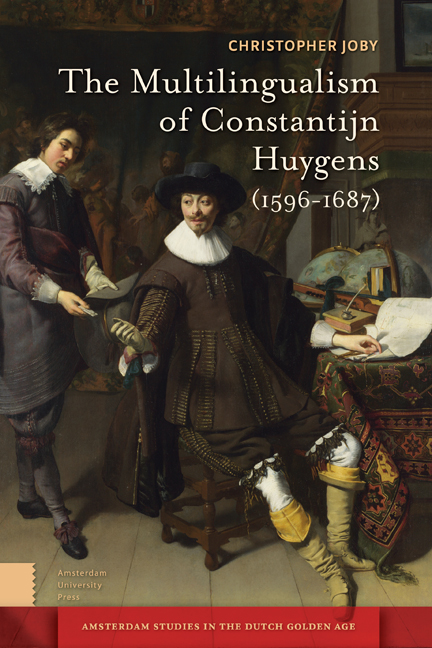Book contents
- Frontmatter
- Dedication
- Contents
- List of Illustrations
- List of Abbreviations
- Acknowledgements
- Prologue
- 1 Multilingualism: An Introduction
- 2 Huygens’s Language Acquisition
- 3 The ‘Multidimensionality’ of Huygens’s Multilingualism
- 4 Huygens’s Multilingualism in Music, Science, and Architecture
- 5 Huygens and Translation
- 6 Code Switching in Huygens’s work
- 7 The Multilingualism of Huygens’s Children
- Epilogue
- Appendix
- Bibliography
- Index
7 - The Multilingualism of Huygens’s Children
Published online by Cambridge University Press: 16 February 2021
- Frontmatter
- Dedication
- Contents
- List of Illustrations
- List of Abbreviations
- Acknowledgements
- Prologue
- 1 Multilingualism: An Introduction
- 2 Huygens’s Language Acquisition
- 3 The ‘Multidimensionality’ of Huygens’s Multilingualism
- 4 Huygens’s Multilingualism in Music, Science, and Architecture
- 5 Huygens and Translation
- 6 Code Switching in Huygens’s work
- 7 The Multilingualism of Huygens’s Children
- Epilogue
- Appendix
- Bibliography
- Index
Summary
In this chapter, in some sense we come full circle as we consider the acquisition and use of languages by Constantijn Huygens Sr.'s children. Just as his own father, Christiaen, had given the learning of languages a central role in the young Constantijn's education, so too Constantijn recognized that the acquisition of languages would be vital for the future careers of his own children. He had four sons, Constantijn Jr., Christiaan, Lodewijck, and Philips, and one daughter, Susanna. Shortly after her birth in 1637, Constantijn's wife, Susanna van Baerle, his Sterre, died. The first two sons, Constantijn Jr. (1628-1697) and Christiaan (1629-1695), were to have glittering careers, in which they both made extensive use of their knowledge of a range of languages. Lodewijck (1631-1699), the third son, was a slightly wayward character, but Constantijn managed to put his undoubted linguistic skills to good use by sending him on diplomatic missions to England and Spain. Philips (1632-1657) was perhaps the least gifted of the sons and unfortunately died at a young age in Prussia on a diplomatic mission to Sweden and Poland. However, the few remaining letters we have by him show that he had inherited at least some of his father's aptitude for languages. For his daughter Susanna (1637-1725), educational opportunities were limited. As was the custom in those days, she was educated to be a good wife rather than to have a career of her own.
A number of sources are available for this study. For the early years of the children's education there is a manuscript in Dutch referred to as Jongelingsjaren (‘Years of youth’) in Constantijn Sr.'s hand which provides a detailed account of the early years of each of his children up to 1648, when Constantijn Jr. turned twenty and was expected to begin keeping his own journal. There are also a number of letters to Constantijn Sr., particularly those from the Latin and Greek tutor Hendrik Bruno, which describe the children's progress and what material they were reading. It is not always possible to reconcile the details of these sources, which may in part be due to the fact that Constantijn Sr. probably compiled Jongelingsjaren from memory a number of years after the events it describes.
- Type
- Chapter
- Information
- The Multilingualism of Constantijn Huygens (1596–1687) , pp. 273 - 308Publisher: Amsterdam University PressPrint publication year: 2014



